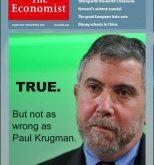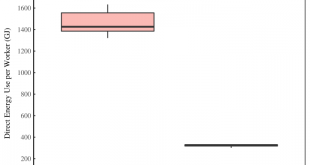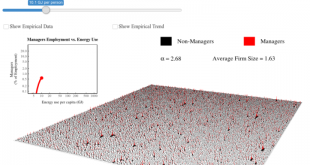Economy, Society, Nature: An introd… By Geoff Davies
Read More »Paul Krugman — finally — admits he was wrong!
from Lars Syll Paul Krugman has never suffered fools gladly. The Nobel Prize-winning economist rose to international fame—and a coveted space on the New York Times op-ed page—by lacerating his intellectual opponents in the most withering way. In a series of books and articles beginning in the 1990s, Krugman branded just about everybody who questioned the rapid pace of globalization a fool who didn’t understand economics very well. “Silly” was a word Krugman used a lot to describe pundits...
Read More »MMT has become part of the mainstream conversation, but . . .
from David Colander MMT has done what few heterodox economic theories have done; it has become part of the mainstream conversation. It is talked about by pundits and politicians, which means that standard macro economists have felt compelled to respond to its arguments. That’s an enormous accomplishment that will, I hope, lead to improvements in macroeconomic theory and policy. Its creators deserve to be congratulated. But I am not too hopeful. MMT is more of a marketing success than an...
Read More »Econometrics — the danger of calling your pet cat a dog
from Lars Syll Since econometrics doesn’t content itself with only making optimal predictions, but also aspires to explain things in terms of causes and effects, econometricians need loads of assumptions — most important of these are additivity and linearity. Important, simply because if they are not true, your model is invalid and descriptively incorrect. And when the model is wrong — well, then it’s wrong. The assumption of additivity and linearity means that the outcome variable is,...
Read More »Can a service transition save the planet?
from Blair Fix Let’s talk sustainability. Unless you’re an anti-science crank, you probably agree that we’ve got a problem with carbon emissions. We need to drastically cut emissions to avoid catastrophic climate change. On this we should all agree. The question that’s open for debate is how to cut emissions. I think we actually know very little about how do to this. But even worse than knowing little is thinking we know a lot when we don’t. As the old saying goes, “It ain’t what you...
Read More »Accumulate, accumulate! That is Moses and the prophets!
from Lars Syll In the postwar period, it has become increasingly clear that economic growth has not only brought greater prosperity. The other side of growth, in the form of pollution, contamination, wastage of resources, and climate change, has emerged as perhaps the greatest challenge of our time. Against the mainstream theory’s view on the economy as a balanced and harmonious system, where growth and the environment go hand in hand, ecological economists object that it can rather be...
Read More »As it dies, we talk about the ‘free market’ more
from Blair Fix In The Growth of Hierarchy and the Death of the Free Market, I argued that economic development involves killing the free market. What was the evidence? As energy use increases, so does the relative number of managers. This growth of managers, I argued, indicates that economic development involves the growth of hierarchy. I showed that a simple model of hierarchy could explain why the number of managers increases with energy use. To get a sense for this model, try the app...
Read More »‘Nobel prize’ winners Duflo and Banerjee do not tackle the real root causes of poverty
from Lars Syll Some go so far as to insist that development interventions should be subjected to the same kind of randomised control trials used in medicine, with “treatment” groups assessed against control groups. Such trials are being rolled out to evaluate the impact of a wide variety of projects – everything from water purification tablets to microcredit schemes, financial literacy classes to teachers’ performance bonuses … The real problem with the “aid effectiveness” craze is that...
Read More »Impoverishing economics
from David Ruccio I cringe when I listen to or watch these interviews. But here it is, with the Real News Network. The interview was based on my recent blog post, “Economics of poverty, or the poverty of economics.” [embedded content] I also want to recommend a recent piece by Ingrid Harvold Kvangraven [ht: ms], who argues that The interventions considered by the Nobel laureates tend to be removed from analyses of power and wider social change. In fact, the Nobel committee specifically...
Read More »WEA Conference “GOING DIGITAL” submission deadline extended
Going Digital What is the Future of Business and Labour? A conference from the WEA 11th November to 9th December, 2019 visit conference website contacts: Maria Alejandra Madi: [email protected] Małgorzata Dereniowska: [email protected]
Read More » Real-World Economics Review
Real-World Economics Review






